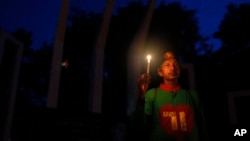Bangladesh earned a place in the 2015 Global Impunity Index (GII) published by the Committee to Protect Journalists (CPJ). Bloggers and rights activists say the ranking accurately reflects a growing “culture of impunity” in the country, particularly after four secular bloggers were hacked to death this year.
The global index, released last week by the New York-based advocacy group, ranks 14 nations with at least five unsolved killings of journalists during a ten year period, between September 1, 2005 and August 31, 2015.
Somalia tops the list, followed by Iraq, Syria and the Philippines. Bangladesh is ranked 12th.
Unable or Unwilling to Bring Killers to Justice
Sumit Galhotra, CPJ's Asia program research associate, said Bangladesh landed a spot on the index for the first time since 2011 because of its inability or unwillingness in the past year to stop attacks on journalists and bloggers or bring their killers to justice.
“The killing of bloggers is not the only reason Bangladesh finds itself here. Those working in traditional forms of journalism including print have also been murdered with impunity over the past decade. But the spate of blogger killings has certainly played a major factor in propelling Bangladesh to this list,” Galhotra told VOA.
Ibrahim Khalil Sobak, a Bangladeshi blogger, said that no convincing action had been taken against the killers of the bloggers and the country deserved to be globally identified as a country where killers go free.
“The authorities in Bangladesh have failed to protect the bloggers. And after some of them were brutally killed, that the cases are not being investigated properly by them, it has been known to all around the globe,” Sobak told VOA.
Bloggers Critical of Religious Extremism
This year, four secular bloggers were hacked to death in Bangladesh by suspected Islamists. In February, Bangladeshi-American blogger and writer Avijit Roy was hacked to death in Dhaka. Between March and August, three others -- Washiqur Rahman, Ananta Bijoy Das and Neeladri Chatterjee -- were killed in machete attacks.
“A total of five of Bangladesh's seven victims of unsolved murders over the last decade are bloggers who criticized religious extremism… Prime Minister Sheikh Hasina and the nominally secular ruling Awami League party have done little to speak out for justice in these crimes, allowing political interests to trump rule of law,” the CPJ said in a statement.
Bangladesh police said the local hard-line Islamist militant group Ansarullah Bangla Team (ABT) was behind the blogger killings. Although police have detained some ABT members as suspects, none of the cases have been solved.
In mostly Muslim Bangladesh, secular bloggers are considered Islam-haters. Several Islamist groups have held protest rallies demanding public execution of the bloggers.
In August, Bangladesh’s national police chief said that legal action would be taken against the bloggers if their writings offended people.
Government Inaction
Phil Robertson, Asia deputy director of Human Rights Watch, said the lack of government commitment to solve the killings was made clear when the police chief blamed the bloggers for the attacks on them.
“Instead of questioning the content of their messages, the IGP should have left no stone unturned in finding and arresting those who kill people simply because they disagree with their beliefs,” Robertson told VOA.
“The inaction of the government on these murder cases is nothing short of outrageous and this is a message that development donors who care about human rights must make clear to PM Sheikh Hasina and her government," he said.
The government of Sheikh Hasina has said little publicly about the attacks on the bloggers. In the recent killings of two foreigners in the country, the prime minister blamed opposition forces for the attacks. The government's reluctance to speak out on the killings and the little headway made in the effort to bring the killers to justice reflects a worrying trend, said Transparency International Bangladesh executive director Iftekhar Zaman.
“Instances of enforced disappearances, extra-judicial killings, tortures and deaths in custody and disproportionate use of force allegedly by a section of the law-enforcement agencies have been pervasive, partly for a denial syndrome at the political and institutional level and partly for growing politicization of some of these agencies causing erosion of their professional skills, capacity and integrity to discharge their entrusted authority fairly, neutrally and effectively,” Zaman told VOA. “Examples of bringing to justice those who are responsible for the professional decay and for transforming law-enforcers into law-breakers in a sufficiently deterrent manner have also been few and far between.”
For now, there is a suspicion among bloggers that many of the attacks on them are driven by political interests. At least 12 bloggers have fled abroad since the killings because of fears they could be next. With little headway in the investigations into the killings, and the government's general silence on the issue, they say this culture of impunity will likely continue.









